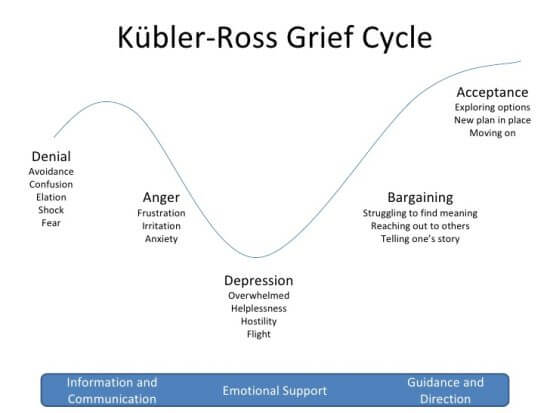
All of us are increasingly close to those who have contracted Covid-19 or died from it, and the Kübler-Ross model of the five stages of grief is a powerful tool to support those grieving such terrible loss. Away from my writing here I, like all of us, face personal circumstances through this and feel the power of this model for grieving such loss.
My daily writing, though, is around OpenLeadership, so today seek to relate this model to how people may be feeling now and through this as it relates to loss of their normal life.
Leadership is about people, and in order to serve, awareness of ourselves, our people, our environment and, for the last two months, my focus has been in supporting leaders in their awareness of and response to the ever-shifting pandemic environment. So, let us relate the the five stages of grief to the response of people you may lead in your organisations.

The five stages are:
- Denial
- Anger
- Depression
- Bargaining
- Acceptance
There are many, many articles you can find on relating this to the pandemic, however, I’m going to make only some simple points and hope they are of value to you in leading yourself, your family, those you lead in business and elsewhere:
- The time to pass through each stage is not linear
- This is not a simple stage by stage process
- Watch out for different professional and personal experiences
- Events can jump us forward or back to another stage
- Every human is experiencing this differently
- Acceptance does not mean you are “done”
The time to pass through each stage is not linear
There is no prescribed amount of time (or intensity) for each stage, simply recognise that each one forms part of the process of grieving for loss, whether that is the loss of a loved one or the loss of our “normal” and the certainty we felt we had around our lives.
Some people may “fly through” stages (eg never feeling angry), others may sit stuck in one stage even up to now, eg denial such as pervasive energy of : “I just need this to be over with so life can go back to normal!” etc.
This is not a simple stage by stage process
Each person will experience the stages differently, with different levels of intensity, Some may skip stages entirely, some may sit locked in one.
I recommend you consider the five stages for yourself, then for others you know well, such as close family, colleagues, friends. Reflect on your own experience so far as well as theirs.
One may have had very little denial or anger, but then sat in depression for weeks on end, skipped bargaining then reached acceptance. Another may have not leapt ahead to acceptance in the first days and embraced change.
I am sure you can list many examples from your own experience. Do take time to reflect on them and seek to empathise with each person’s experience.
Watch out for different professional and personal experiences
A live situation last week with a client was a team member who for weeks had been operating well with the change in work environment, but then recently came forward and said they can’t cope at home so need to work far fewer hours, accompanying that with terse and passive communication indicative of high stress.
Be aware, as a leader, that some may be really struggling at home and on a personal level but don’t want to let you know, holding their personal and professional lives separate.
Be an open leader, talk often with your people, make time for connection with teams (eg coffee zooms), and also 1:1. Do show your own strength as a leader by sharing your own vulnerabilities, your fears, your “moments” and how you have and are looking to move forwards. Such vulnerability is strength and will encourage your people to step forward for understanding and support rather than waiting until they reach a snapping point.
Events can jump us forward or back to another stage
Yes, this is not going to be a linear process of one stage to the next then to acceptance. Be particularly prepared for the “Dance” (highly recommend the articles in the series “The Hammer and the Dance“, which I started reading back on March 20th and have informed my thinking.)
We will be “dancing” with infection rates for at least a year around the world, so we will find times where just when we thought things were getting to a level we could settle down on, we may find events through us back to an earlier stage of grief (denial, anger, depression). This may be a lockdown in our area or nationally as a spike in infections increase, this could be a message from a contact tracer telling us to self-isolate for two weeks just when we had settled back to a new and adjusted work routine.
Events will be happening in the Dance for a long time, be aware of the five stages of grief and how they may affect you and those you lead
Every human is experiencing this differently
Here I simply emphasise that every single person is having both the same shattering disruption to their planned and regular life, yet at the same time their feelings, their stage of grief, will be unique to them now and as we move forwards.
Leadership is about people. Be self-aware, be caring and understanding. Seek always to understand.
Acceptance does not mean you are “done”
This is core to the five stages of grief. When we lose a loved one and finally reach acceptance, that does not mean life is the same. That loved one is gone and always will be. Life is forever changed, yet when we are in a space of acceptance we move forwards with life in that different form.
Acceptance of our current situation (and our situation as we move forwards) is similar. What we had before is gone. Yes, ultimately, much of it can come back, but things will be different. Some parts of our past life will be gone forever, some changed forever.
Acceptance as a stage, though, is key. It puts us in a state of mind where we can continue with positive and forward-looking energy. As I have written about before and will do so again soon, there are many, many opportunities that will be positive as we flow through and ultimately emerge from this “dance”.
We will emerge back into the sunlight in time. Humans are stunning resilient and I am so positive about the future. For now, though, I feel this model as applied to ourselves and those we lead has power, I hope you focus on and take value from applying it.
